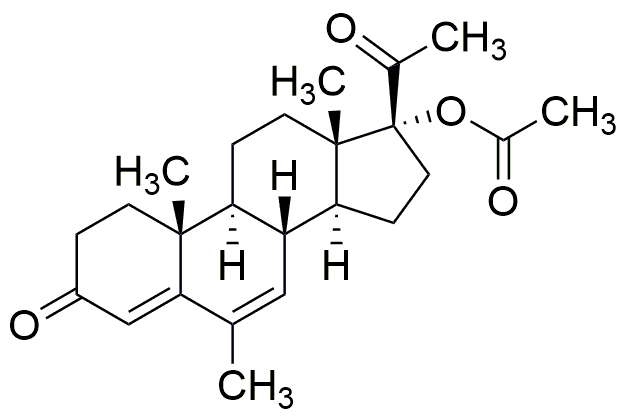Megestrol acetate is widely utilized in research focused on:
- Appetite Stimulation: Commonly used in patients with severe weight loss due to chronic illnesses, it helps to stimulate appetite and promote weight gain, making it valuable in oncology and geriatrics.
- Hormonal Therapy: Employed in the treatment of hormone-sensitive cancers, particularly breast and endometrial cancers, it acts as a progestin, providing an alternative to traditional therapies.
- Endometriosis Management: It is effective in managing symptoms of endometriosis by suppressing the growth of endometrial tissue, offering relief to patients suffering from this painful condition.
- Research in Reproductive Health: Used in studies exploring hormonal regulation and reproductive health, it aids researchers in understanding the mechanisms of hormonal therapies and their effects on various conditions.
- Clinical Trials: Frequently involved in clinical trials assessing new treatment protocols for weight management and cancer therapies, providing critical data that can lead to improved patient outcomes.
General Information
Properties
Safety and Regulations
Applications
Megestrol acetate is widely utilized in research focused on:
- Appetite Stimulation: Commonly used in patients with severe weight loss due to chronic illnesses, it helps to stimulate appetite and promote weight gain, making it valuable in oncology and geriatrics.
- Hormonal Therapy: Employed in the treatment of hormone-sensitive cancers, particularly breast and endometrial cancers, it acts as a progestin, providing an alternative to traditional therapies.
- Endometriosis Management: It is effective in managing symptoms of endometriosis by suppressing the growth of endometrial tissue, offering relief to patients suffering from this painful condition.
- Research in Reproductive Health: Used in studies exploring hormonal regulation and reproductive health, it aids researchers in understanding the mechanisms of hormonal therapies and their effects on various conditions.
- Clinical Trials: Frequently involved in clinical trials assessing new treatment protocols for weight management and cancer therapies, providing critical data that can lead to improved patient outcomes.
Documents
Safety Data Sheets (SDS)
The SDS provides comprehensive safety information on handling, storage, and disposal of the product.
Product Specification (PS)
The PS provides a comprehensive breakdown of the product’s properties, including chemical composition, physical state, purity, and storage requirements. It also details acceptable quality ranges and the product's intended applications.
Certificates of Analysis (COA)
Search for Certificates of Analysis (COA) by entering the products Lot Number. Lot and Batch Numbers can be found on a product’s label following the words ‘Lot’ or ‘Batch’.
Numéro de catalogue
Numéro de lot/série
Certificates Of Origin (COO)
This COO confirms the country where the product was manufactured, and also details the materials and components used in it and whether it is derived from natural, synthetic, or other specific sources. This certificate may be required for customs, trade, and regulatory compliance.
Numéro de catalogue
Numéro de lot/série
Safety Data Sheets (SDS)
The SDS provides comprehensive safety information on handling, storage, and disposal of the product.
DownloadProduct Specification (PS)
The PS provides a comprehensive breakdown of the product’s properties, including chemical composition, physical state, purity, and storage requirements. It also details acceptable quality ranges and the product's intended applications.
DownloadCertificates of Analysis (COA)
Search for Certificates of Analysis (COA) by entering the products Lot Number. Lot and Batch Numbers can be found on a product’s label following the words ‘Lot’ or ‘Batch’.
Numéro de catalogue
Numéro de lot/série
Certificates Of Origin (COO)
This COO confirms the country where the product was manufactured, and also details the materials and components used in it and whether it is derived from natural, synthetic, or other specific sources. This certificate may be required for customs, trade, and regulatory compliance.


